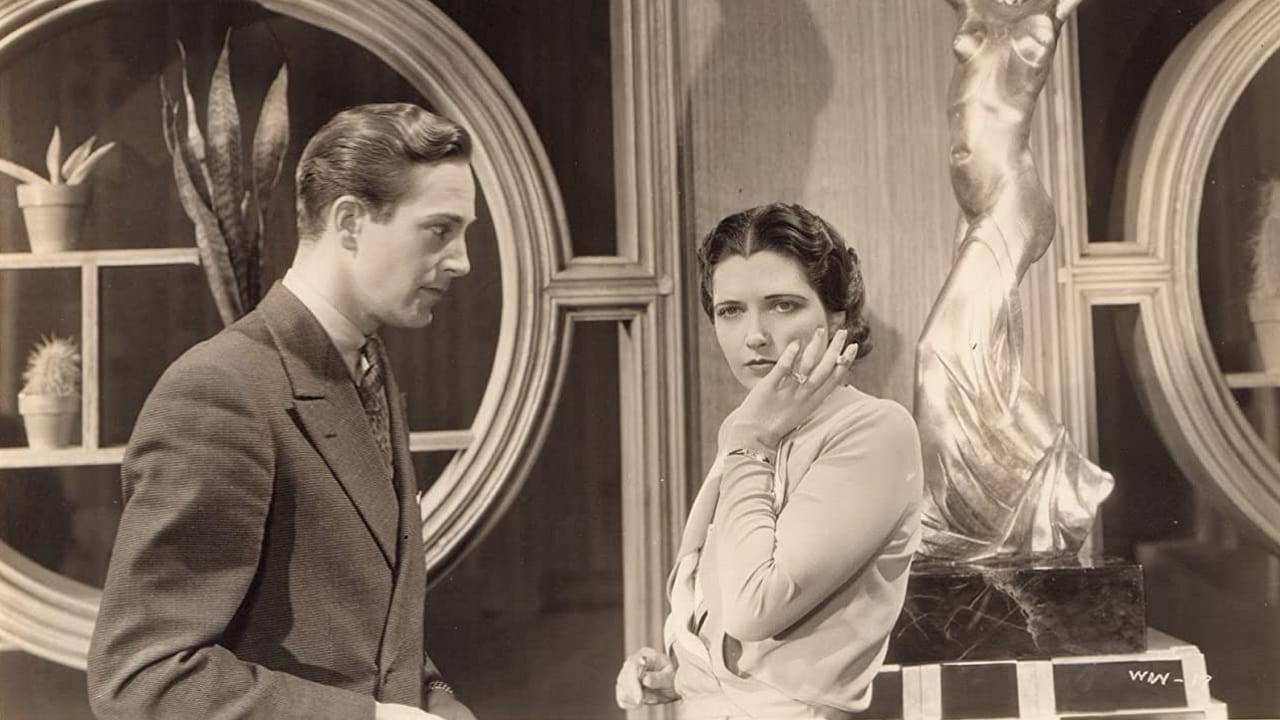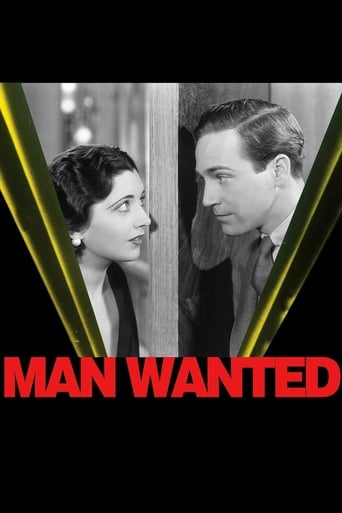



the audience applauded
Terrible acting, screenplay and direction.
It’s sentimental, ridiculously long and only occasionally funny
View MoreMostly, the movie is committed to the value of a good time.
View More"Man Wanted" is a delightful film that reflects so many of the themes of its time. Released in 1932, this pre-Code story plays with conventions, titillating the audiences of its day.First of all, there is a reversal of gender roles involving the central characters. Kay Francis plays a female executive who hires a male secretary. She is all business, but the two of them occasionally find themselves playing peek-a-boo with their libidos. Her husband spends his time playing polo and partying.The dialogue is filled with allusions to the "free love" and open marriage ideas of the time. The characters flirt with the freedoms that, no doubt, intrigued audiences of the thirties. They considered the possibility of marriage as a relationship of equals who respect each other without binding. Some of the peripheral characters are not very developed, but the central characters are very strong. Dressed to the nines and occupying some stylish art deco sets, they glibly play their parts while showing that underneath there are other, more serious, emotions at play. In this, the story is maybe not so modern, eventually paying its homage to love and the honesty of traditional commitments.Kay Francis and David Manners are both filmed strikingly. There is one scene of a stolen kiss that is iconic. The director uses the camera to convey a sense of intimacy when required. At other times, he lets the camera flow through a scene, capturing the feeling of gaiety and demonstrating a facility that is very welcome so early in the history of talkies.
View MoreI love 1930's movies, and I like many of the actors in this cast, but this film just isn't worth the time it takes to watch it, in my opinion. I'm a little annoyed with myself that I didn't just turn it off. Other reviewers described most of the objections I had to the storyline, such as the poor treatment of secretaries and fiancées; they really interfered with my enjoyment. The film seems to be trying to justify the typical exploitation of workers practiced by many big movie studios (I'm not sure about Warner Bros' record with that, but it seems like the type of thing MGM would endorse). The idea of "The Office" is glorified in a way that's ridiculous. And since the film was made in the Depression, I couldn't help but wonder about the studio's purpose behind all this "if you don't work all night you're a parasite" stuff. (Possible spoiler ahead) And the characters all turn on one person in the last scene, when she's really the one who was wronged. The film does have a few good moments, and some nice outfits and Art Deco sets, but it mostly seems to be a waste of good performers, like Claire Dodd. (I thought David Manners' performance was weak, however--just smooth talk and popping eyes.) It was nice that some respect was given to the idea of a serious woman editor, but the actual scenes showing Kay Francis working didn't convince me that she was actually that good at her job. She keeps people waiting while playing around with her husband in the office, approves some perfectly mediocre sketches, demands endless overtime of her workers, and is unable to write out her own letters if a secretary has to leave. There just isn't enough plot to get the thing going, so the character played by David Manners has to treat someone badly just to provide some juice, and the audience is supposed to approve of this pointless behavior. Kay Francis manages to inject some believable emotion into her scenes, but her motivations are confused--(possible spoiler) it's hard to believe she could be very serious about the David Manners character, when so much of the film is given over to her relationship with her husband.If you want to see a much snappier film about a 1930's office, I recommend "Counsellor at Law," with John Barrymore (1933). It has some of the same plot themes as this one, but does them all much better.
View MoreMan Wanted (1932) ** (out of 4) Workaholic editor Lois Ames (Kay Francis) grows tired of women secretaries complaining so she hires an ambitious young man (David Manners). Soon the two are working long hours together and they start to fall for one another but the only problem is that she's married and he has a fiancé (Una Merkel). MAN WANTED is yet another "B" programmer from Warner that certainly has a few pre-code elements but in the end the product just seems rushed and nothing really comes together. I think the biggest problem is that the screenplay just doesn't have enough fre sh or original ideas to carry out even the short 62-minute running time. With such a short time you really shouldn't be looking at your clock at the half hour mark and it's even worse when the next thirty-minutes just drag along. The film has a pretty simple set-up because you know Francis' husband is going to be a no-good party animal and of course she's going to be attracted to Manners because he's hard working like she is. That's fine. What doesn't work is that we have to sit through forty-minutes worth of back and forth where neither character knows what they want yet it's obvious to the viewer. I think Francis was always good at playing these strong women and that continues here. She's certainly believable in the part and when she's going overboard trying to keep her busy schedule going it makes you feel she's being real. Manners is also pretty good in his part, although the screenplay certainly doesn't make it a very glamorous part. Merkel is quite annoying with a high-pitched voice but that's what the character called for. Andy Devine plays that type of character that only he could. Universal horror fans will be happy to see Edward Van Sloan in a quick scene and yes he gets to appear with Manners. MAN WANTED has a couple good ideas but in the end there's just not enough here worth watching so this is clearly just for fans of the actors.
View MoreFast-paced and well directed, Man Wanted is a compact entertainment that provides a window to early 1930s attitudes on several subjects but doesn't sermonize on any of them. Kay Francis and David Manners are sufficiently colorless to be easily molded by director Dieterle, who adds interesting pictorial touches throughout. Also of great interest is Gregg Toland's remarkable cinematography. The fact that the film is somewhat hard to categorize - is it a melodrama with comic touches or a satire with occasional pathos? - indicates the cleverness of Dieterle and writers Robert Lord and Charles Kenyon. The filmmakers are anything but heavy-handed in their commentary on gender roles, leaving the audience to reach its own conclusions about thorny workplace issues that persist in the 21st century. Adding to the general delight of the film are Andy Devine and Una Merkel in unexpected roles, with Elizabeth Patterson and Edward Van Sloan also glimpsed in very different parts than those for which they are most well known. This gem, seen occasionally on TCM, is well worth your time.
View More